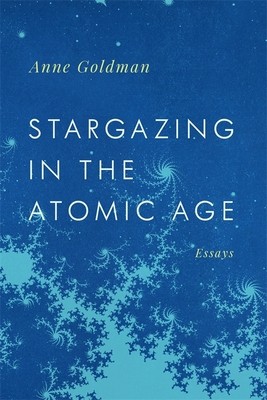
- We will send in 10–14 business days.
- Author: Anne Goldman
- Publisher: Georgia Review Books
- ISBN-10: 0820358444
- ISBN-13: 9780820358444
- Format: 16.2 x 22.5 x 1.2 cm, softcover
- Language: English
- SAVE -10% with code: EXTRA
Reviews
Description
A Kirkus Best Book of the Year
During World War II, with apocalypse imminent, a group of well-known Jewish scientists and artists sidestepped despair by challenging themselves to solve some of the most difficult questions posed by our age. Many had just fled Europe. Others were born in the United States to immigrants who had escaped Russia's pogroms. Alternately celebrated as mavericks and dismissed as eccentrics, they trespassed the boundaries of their own disciplines as the entrance to nations slammed shut behind them. In Stargazing in the Atomic Age, Anne Goldman interweaves personal and intellectual history in exuberant essays that cast new light on these figures and their virtuosic thinking. In lyric, lucent sentences that dance between biography and memoir as they connect innovation in science with achievement in the arts, Goldman yokes the central dramas of the modern age with the brilliant thinking of earlier eras. Here, Einstein plays Mozart to align mathematical principle with the music of the spheres and Rothko paints canvases whose tonalities echo the stark prose of Genesis. Nearby, Bellow evokes the dirt and dazzle of the Chicago streets, while upon the heels of World War II, Chagall illuminates stained glass no less buoyant than theeffervescent notes of Gershwin's Rhapsody in Blue. In these essays, Goldman reminds readers that Jewish history offers as many illustrations of accomplishment as of affliction. At the same time, she gestures toward the ways in which experiments in science and art that defy partisanship can offer us inspiration during a newly divisive era.
EXTRA 10 % discount with code: EXTRA
The promotion ends in 20d.08:52:32
The discount code is valid when purchasing from 10 €. Discounts do not stack.
- Author: Anne Goldman
- Publisher: Georgia Review Books
- ISBN-10: 0820358444
- ISBN-13: 9780820358444
- Format: 16.2 x 22.5 x 1.2 cm, softcover
- Language: English English
A Kirkus Best Book of the Year
During World War II, with apocalypse imminent, a group of well-known Jewish scientists and artists sidestepped despair by challenging themselves to solve some of the most difficult questions posed by our age. Many had just fled Europe. Others were born in the United States to immigrants who had escaped Russia's pogroms. Alternately celebrated as mavericks and dismissed as eccentrics, they trespassed the boundaries of their own disciplines as the entrance to nations slammed shut behind them. In Stargazing in the Atomic Age, Anne Goldman interweaves personal and intellectual history in exuberant essays that cast new light on these figures and their virtuosic thinking. In lyric, lucent sentences that dance between biography and memoir as they connect innovation in science with achievement in the arts, Goldman yokes the central dramas of the modern age with the brilliant thinking of earlier eras. Here, Einstein plays Mozart to align mathematical principle with the music of the spheres and Rothko paints canvases whose tonalities echo the stark prose of Genesis. Nearby, Bellow evokes the dirt and dazzle of the Chicago streets, while upon the heels of World War II, Chagall illuminates stained glass no less buoyant than theeffervescent notes of Gershwin's Rhapsody in Blue. In these essays, Goldman reminds readers that Jewish history offers as many illustrations of accomplishment as of affliction. At the same time, she gestures toward the ways in which experiments in science and art that defy partisanship can offer us inspiration during a newly divisive era.


Reviews